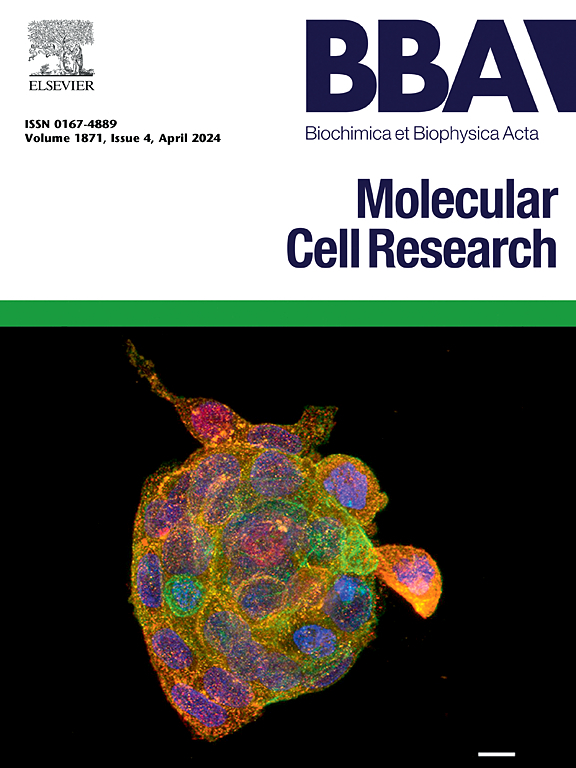PGK1通过调节DDIT4核易位介导子宫内膜异位症的糖酵解和细胞增殖
IF 3.7
2区 生物学
Q1 BIOCHEMISTRY & MOLECULAR BIOLOGY
Biochimica et biophysica acta. Molecular cell research
Pub Date : 2025-06-16
DOI:10.1016/j.bbamcr.2025.120009
引用次数: 0
摘要
子宫内膜异位症(EM)是一种影响10%育龄妇女的妇科疾病,其复杂的发病机制涉及细胞增殖和类似恶性肿瘤的代谢异常。糖酵解通路中关键酶和调节因子的异常表达与子宫内膜异位症的发生有关。磷酸甘油酸激酶1 (PGK1)是糖酵解过程中的关键酶,还具有转录因子共激活因子和蛋白激酶的作用。我们发现PGK1升高并与EM的发展密切相关。PGK1抑制剂NG52通过阻止细胞迁移和增殖来抑制小鼠子宫内膜异位症病变的生长。此外,我们发现DNA损伤反应4 (DDIT4)是PGK1的一个新的下游靶基因。PGK1调控DDIT4的核易位。此外,我们还观察到PGK1上调DDIT4的转录活性,导致DDIT4过表达,促进子宫内膜异位症的发生。这些发现可能为子宫内膜异位症的非激素靶向治疗提供新的见解。本文章由计算机程序翻译,如有差异,请以英文原文为准。
PGK1 mediates glycolysis and cell proliferation in endometriosis by regulating DDIT4 nuclear translocation
Endometriosis (EM), a gynecologic disorder affecting 10 % of childbearing age women, with complex pathogenesis involving cell proliferation and metabolic abnormalities similar to malignancies. Unusual expression of key enzymes and regulators in glycolysis pathway contributes to the development of endometriosis. Phosphoglycerate kinase 1 (PGK1) was a key enzyme in glycolysis with additional roles as a transcription factor co-activator and protein kinase. We discovered that PGK1 was elevated and associated strongly with the development of EM. The PGK1 inhibitor NG52 inhibited the growth of endometriosis lesions in mice by preventing cell migration and proliferation. Furthermore, we found that DNA damage response 4 (DDIT4) was a new downstream target gene of PGK1. PGK1 regulated the nuclear translocation of DDIT4. Additionally, we also observed that PGK1 up-regulate the transcriptional activity of DDIT4, leading to DDIT4 overexpression that promoted the development of endometriosis. These findings may provide new insights for potential non-hormonal targeted therapies for endometriosis treatment.
求助全文
通过发布文献求助,成功后即可免费获取论文全文。
去求助
来源期刊
CiteScore
10.00
自引率
2.00%
发文量
151
审稿时长
44 days
期刊介绍:
BBA Molecular Cell Research focuses on understanding the mechanisms of cellular processes at the molecular level. These include aspects of cellular signaling, signal transduction, cell cycle, apoptosis, intracellular trafficking, secretory and endocytic pathways, biogenesis of cell organelles, cytoskeletal structures, cellular interactions, cell/tissue differentiation and cellular enzymology. Also included are studies at the interface between Cell Biology and Biophysics which apply for example novel imaging methods for characterizing cellular processes.

 求助内容:
求助内容: 应助结果提醒方式:
应助结果提醒方式:


